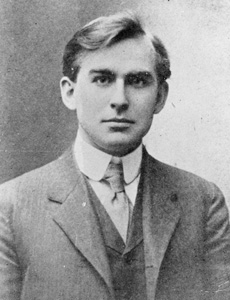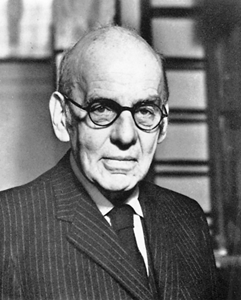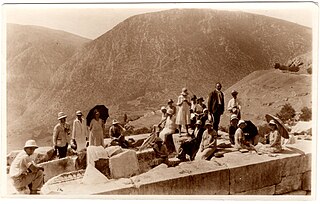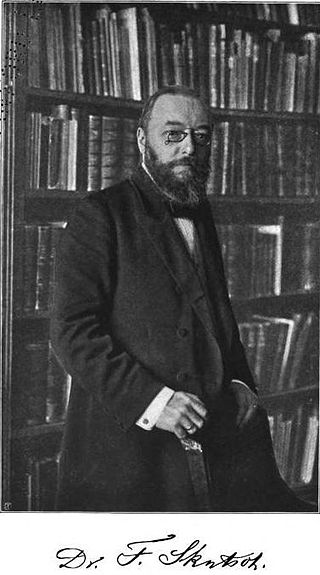Related Research Articles

Quintus Horatius Flaccus, commonly known in the English-speaking world as Horace, was the leading Roman lyric poet during the time of Augustus. The rhetorician Quintilian regarded his Odes as the only Latin lyrics worth reading: "He can be lofty sometimes, yet he is also full of charm and grace, versatile in his figures, and felicitously daring in his choice of words."
In Roman Mythology, Fames is the personification of hunger, who can arouse an insatiable appetite. She was often said to be one of the several evils who inhabit the entrance to the Underworld. In Ovid's Metamorphoses, she lives in Scythia, a desolate place where she scrabbles unceasingly for the scant vegetation there, and at Ceres' command, she punishes Erysichthon with a never-ending hunger. Servius calls Fames the greatest of the Furies. She is the equivalent of the Greek Limos.

Johann Gottfried Jakob Hermann was a German classical scholar and philologist. He published his works under the name Gottfried Hermann or its Latin equivalent Godofredus Hermannus.
Charles Edwin Bennett was an American classical scholar and the Goldwin Smith Professor of Latin at Cornell University. He is best remembered for his book New Latin Grammar, first published in 1895 and still in print today.
Frederick M. Ahl is a professor of classics and comparative literature at Cornell University. He is known for his work in Greek and Roman epic and drama, and the intellectual history of Greece and Rome, as well as for translations of tragedy and Latin epic.
David Roy Shackleton Bailey was a British scholar of Latin literature who spent his academic life teaching at the University of Cambridge, the University of Michigan, and Harvard. He is best known for his work on Horace, and Cicero, especially his commentaries and translations of Cicero's letters.

Robert Seymour Conway FBA was a British classical scholar and comparative philologist.

Tenney Frank was a prominent American ancient historian and classical scholar. He studied many aspects of Ancient Rome, for instance its economy, imperialism, demographics and epigraphy.

Eduard David Mortier FraenkelFBA was a German classical scholar who served as the Corpus Christi Professor of Latin at the University of Oxford from 1935 until 1953. Born to a family of assimilated Jews in the German Empire, he studied Classics at the universities of Berlin and Göttingen. In 1934, antisemitic legislation introduced by the Nazi Party forced him to seek refuge in the United Kingdom where he eventually settled at Corpus Christi College.

Samuel Walter Miller was an American linguist, classics scholar and archaeologist responsible for the first American excavation in Greece and a founder of the Stanford University Classics department.

Johannes Vahlen was a German classical philologist. He was the father of mathematician Theodor Vahlen (1869–1945).

Franz Skutsch was a German classical philologist and linguist born in Neisse. He was the father of classical philologist Otto Skutsch (1906-1990).
Arthur Palmer (1841–1897) was a Canadian-Irish classical scholar.
William James Niall Rudd was an Irish-born British classical scholar.
Eugène Benoist was a French classical philologist.
Richard F. Thomas is the George Martin Lane Professor of the Classics at Harvard University. His scholarship has focused on various critical approaches, metrics and prose stylistics, genre studies, translation theory and practice, and the reception of Classical literature and culture, particularly with respect to Virgil.
Robert Gregg Bury was an Irish clergyman, classicist, philologist, and a translator of the works of Plato and Sextus Empiricus into English.

Edward Kennard RandFBA, known widely as E.K. Rand or to his peers as EKR, was an American classicist and medievalist. He served as the Pope Professor of Latin at Harvard University from 1901 until 1942, during which period he was also the Sather Professor at the University of California, Berkeley, for two terms. Rand is best known for his 1928 work, Founders of the Middle Ages.

The Latin phrase Epicuri de grege porcum was a phrase first used by the Roman poet Horace. The phrase appears in an epistle to Albius Tibullus, giving advice to the moody fellow poet:

Charles Burton Gulick was an American classical philologist. He taught at Harvard University from 1892 to 1937.
References
- ↑ The Stanford Daily, Volume 72, Issue 4 (6 October 1927), p. 3.